Click ABOVE and let’s find out.
The Roaring 20’s, the Great Depression and the New Deal
Terms for the week and for our quiz on Friday:
Consumerism- consumers are anyone who buys goods and services. Consumerism is the belief that buying and spending by people is good for the economy.
Model T-the first massed-produced car that was affordable to most Americans. It cost $290 in 1924($5,156 in 2023 dollars).
Suburbs-an outlying part of a city or town.
alliances –an association created to further the common interests of the members
prosperity – flourishing economic activity resulting in wealth for a large number of people
Tariff- a tax paid on imported goods(things brought in by other countries) so that American goods are cheaper and more likely to be bought.
economic depression – a period of economic decline characterized by high unemployment, low levels of production, and business failures
drought – sustained period with no precipitation and restricted water access
veteran – a person who has served in the military
dictators – rulers who have total control and authority over a nation
My blookets-the set to study is the Roaring 20’s and the Great Depression. Copy and paste the address into the browser window:
https://dashboard.blooket.com/my-sets
Terms for our Quiz on Wednesday
Suffrage-the right or privilege of voting
Temperance- abstinence from drinking alcoholic beverages.
Carrie Nation(1846-1911)-a radical member of the temperance movement who became famous for destroying alcohol serving establishments in Kansas.
Susan B. Anthony(1820-1906)-An American women’s rights activist who played a significant role in women’s suffrage, the anti-slavery movement, and the temperance movement.
Women’s Christian Temperance Union-A women’s christian organization dedicated to increasing social justice and public health, including labor laws, suffrage, and the banning of alcohol use.
Prohibition-The. banning of alcohol by the United States.
immigration – moving from one’s homeland to live in another place.
urbanization – the migration of people to live in cities.
sweatshop-a place of work where workers earn very low wages in unhealthy conditions.
15th Amendment-This amendment gave black males the right to vote.
14th Amendment-This amendment gave former slaves citizenship.
18th Amendment-This amendment made the possession, manufacture and distribution of alcohol illegal.
19th Amendment-This amendment gave women the right to vote.
Reconstruction and Immigration After the Civil War
Here are our terms for the next 2 weeks:
Reconstruction Terms:
Reconstruction Amendments- 3 amendments to the US Constitution designed to give blacks the right to freedom, citizenship, and the right to vote after the Civil War.
13th Amendment-outlawed slavery in all states, as well as peonage, where people were forced to work to pay off debts.
14th Amendment-granted citizenship and equal civil rights to anyone born in the US or anyone who wants to be a citizen of the US, including former slaves.
15th Amendment-gave all male citizens the right to vote, regardless of race, color, or former servitude.
Impeachment-to charge someone in public office with misconduct.
Freedman’s Bureau(1865-1872)-Congress’ plan to help 4,000,000 freed slaves transition to freedom. It provided food, education, and medical help. More than 1000 black schools were built during this time, including HBCU’s like Howard University and Morehouse College.
Carpetbaggers-a person from the northern states who went to the South after the Civil War to profit from the Reconstruction. Many become politicians who could be bought off for vote for their causes.
Sharecropping-poor blacks and whites rented land from landowners, who overcharged them for the land and materials. This kept the poor blacks and whites from ever getting ahead where they could buy their own land.
Ku Klux Klan-a secret organization of whites who intimidated blacks by burning their homes and churches and committing violence against them.
Immigration Terms:
Industrialization – economic activity characterized by manufacturing of goods
mass production – the creation of large amounts of goods in a short time
specialization of labor – dividing up work for individuals to have specific tasks
corporations – large businesses that are owned by several people
urbanization – the migration of people to live in cities
immigration – moving from one’s homeland to live in another place
labor union – an organization formed by workers to provide for better working conditions
tenements – a building with several small apartments
free enterprise-an economic system in which private business operates in competition and largely free of state control.
sweatshop-a place of work where workers earn very low wages in unhealthy conditions.
The Civil War-Causes, Battles, and Aftermath
For the next 2 weeks, we will be studying the US Civil War. We will be learning about the causes of the War, the key people involved, the major battles, and the effect on the US during and after the Civl War. We will also be doing group projects on the major battles of the Civil War, and the students will present their multimedia presentations on Google Slides.
Here are our terms for the next 2 weeks, including key people during this time in history.
Sectionalism-an exaggerated devotion to the interests of a region over those of a country as a whole.
States rights-the belief that individual states have the right to limit the power of the federal government and secede from the union, if necessary.
King Cotton-the belief by Southern states that they would survive secession and become an independently wealthy country because of the power of cotton.
Slave-a person who is owned as the property of someone else.
Abolitionist-someone who wishes to abolish or get rid of slavery.
Secession-withdrawal from the federal government of the United States.
Rebel-nickname given to people in the South who supported the Confederacy.
Yankee-nickname given to people in the North who supported the Union.
Dred Scott case-Dred Scott was a slave who was taken to free territory by his owner. He petitioned the Supreme Court to declare him free, but the Court ruled that he was not a citizen, but property, and was not protected by any rights.
Key people:
John Brown-an abolitionist who believed that slavery must be ended by any means. He and his sons organized slaves to revolt at Harper’s Ferry in Virginia in 1859, but the slaves backed out at the last minute, and Mr. Brown’s sons were killed, and John Brown was tried and executed by Virginia.
There were 100,000 weapons stored at the arsenal at Harper’s ferry by 1859.
Harriet Tubman-a slave who escaped in 1849, and used the Underground Railroad to help about 70 family and friends to escape slavery from Maryland to freedom in the North.
Abraham Lincoln-16th President of the US. Issued the Emancipation Proclamation that freed all the slaves in the South in 1863.
As soon as Lincoln was elected South Carolina seceded in December 1860 from the Union, and Florida, Alabama, Mississippi, Georgia, Louisiana and Texas followed soon after in January 1861.
Jefferson Davis-President of the Confederacy from 1861-1865.
Robert E. Lee-Overall Commander of the Confederate Forces from 1861-1865.
Ulysses S. Grant-Overall Commander of the Union Forces from 1864-1865. Later 18th President.
Frederick Douglas-former slave who ended up being an advisor to President Lincoln on abolition issues. Gifted speaker and writer on anti-slavery issues.
Valentines Day Party pics!
Great to see all the parents and grandparents who could make it to our party!

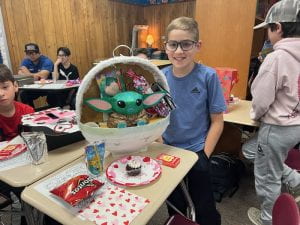
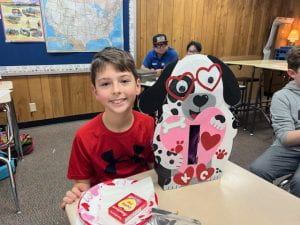


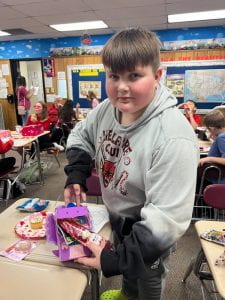

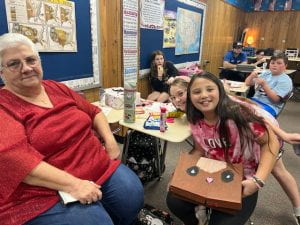


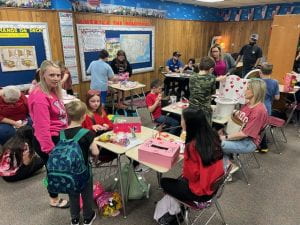
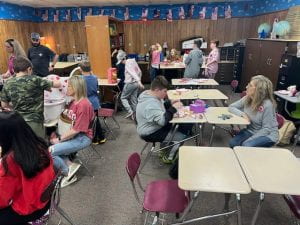
Valentines Party
Parents,
Please have your child make their valentines bag/sack for their valentines this weekend. We will not have time to decorate the bags in class Monday or Tuesday.
Here is my homeroom roster(first names only)
Girls:
Sadie
Aurora
Cassidy
Emma
Emily
Kylie
Agibail
Boys:
Micah
Karsyn
Kolton
Jace
Josiah
Zaiden
Zak
Jackson
Lane
Dylan
Caden
